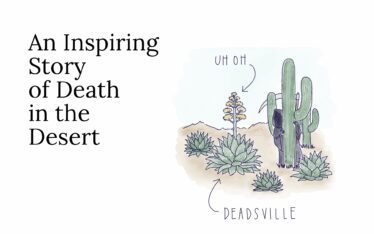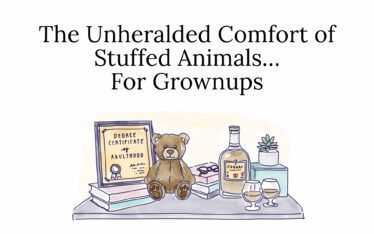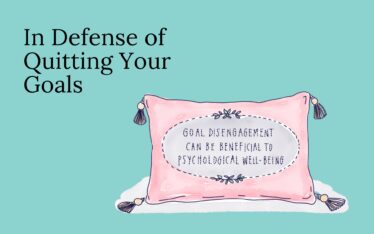Holy crap! I did a TEDx talk! And I lived to tell the tale!
I spent every waking hour over the last five months equal parts giddy with excitement and pee-my-pants nervous. You know how else I can describe this potent cocktail of feelings? UNDENIABLY ALIVE. It felt like I had taken a swig out of a bottle of Concentrated Vitality (I somehow imagine it to be cherry flavored), and then took another swig, and then got that crazy look in my eye and said, “bottoms up!” while chugging the bottle until it was empty and I was full to the brim, intoxicated with life.
It’s been a while since I’ve felt this way — this electric, this alive. I have a tendency to play things safe (and we all know that playing it small and safe creates nothing but a life of soul-macerating mediocrity). My fear can get the best of me, so I don’t always pursue the things that just might give me a shot at feeling like I’m doing something that matters… doing something where the stakes are high… doing something that makes me vulnerable and at risk of messing up along the way and/or in the big moment… doing something that requires me to not take a tumble on the round red TED carpet in four inch heels.
Now that I’ve been bit by the bug of “the anti-comfort zone,” I’m hooked. I will no longer postpone my existence. I will pursue the things that guarantee butterflies, possible failure, and that distinct feeling of pride that comes from trying really, really hard.
Where are you holding back in your life? Where might you be afraid to put yourself out there? Are you wanting to start a podcast? Write a book? Do a piano recital? Try your standup routine at an open mic night? Apply for a bigger job? Do a TEDx talk? Get your invention patented? Ask Mindy in marketing out to that new tapas place? Go. For. It. Life is too short not to.
I’d be honored if you’d watch my talk here (alright I’m begging you to watch it), and even more grateful if you’d share it with the people in your life who might benefit from a little more life in their lives (so, everyone). Thank you, friends!
Here’s the transcript of my TEDx talk:
I’m Jodi Wellman and I have 1,924 Mondays left to live. I’m dying, you’re dying, and we’re all dying of the same terminal illness called life.
Call me crazy, but I think this is excellent news — because remembering that we will die is the secret to a well-lived life. Allow me to explain.
There’s an old Latin phrase called memento mori that translates to “remember we must die,” and I want us to do just that: remember that we are totally temporary. Not in a morbid kind of way — because that’s no fun — but in a wake up and stop-taking-life-for-granted kind of way.
A year after he was diagnosed with pancreatic cancer, Steve Jobs said, “Death is very likely the single best invention of Life. It is Life’s change agent.” Memento mori can act as the spark plugs we need — especially in the midst of a global pandemic — to snap out of autopilot and fully participate in regret-free lives.
In my research and through thousands of hours of coaching people, I’ve found three questions that help us stop taking life for granted, that help us live like we mean it. Let’s dive in.
Question #1: How many Mondays do you have left — in life?
Our Mondays highlight whether we’re in a groove with life or a rut.
As Ellen Glasgow said, “the only difference between a rut and a grave are the dimensions.”
With an average life expectancy of 80 years, we get about 4,000 Mondays in our lifetime. You might have more than 2,500 or only 25 to go until your life calls it quits. How do you want your thousands or hundreds or dozens of weeks left to actually be?
You might be wondering why we’re getting all granular by quantifying our life countdown timers. Researchers call this temporal scarcity — that rare or temporary things are believed to possess greater value. Framing an event, like our lives, with an expiry date makes it feel that much more valuable and precious. The idea of living life more fully isn’t as motivating without the shadow of death showing up to highlight all that we have to lose. Life becomes valued to the extent we recognize its impermanence.
I know a thing or two about taking life for granted. I squandered 10 years of my life to eating disorders that robbed me of aliveness. I let my fears of inadequacy — of not-enough-ness — and my desire to control an uncontrollable world get the best of me, so I alternatingly starved and purged a decade of my life away. We all have ways of coping and numbing, and they’re healthy, until they’re not — until our strategies like drinking a little too much with dinner, endlessly doom-scrolling through social media, zoning out for hours on end in front of the TV… these are all slippery slopes that disengage us from the lives we could be living.
I can’t get the time back that I squandered, but I now see how precious life is, how finite it is, how it’s our choice to make the most of the time we’re lucky to be above ground. This is why I do the work I do — I’m making up for lost time, and I desperately want us to live squander-free lives.
Knowing that I have 1,924 weeks left in my life (if I play my cards right) sparks an intense desire to do this life justice and get to the end of my days without a whiff of regret. Reminding myself of my inevitable, no-way-out-alive, and possibly imminent death — well, that snaps me to attention. That puts a spotlight on the life I’m living and makes me question if it’s worth dying for. Death motivates me to live.
Don’t just take my word for it. There’s a reason people who have had brushes with death — through illnesses, or close-call car accidents, or falls off roofs — they experience what psychologists call the “roar of awakening” — the wake-up call of death. They have an outrageous appreciation for their lives. They have a clarity about the things that matter, and the trivial things that definitely don’t matter anymore.
One of my clients from Chicago, Chris-Tia, was diagnosed with breast cancer when she was 37. She beat it twice, and emerged through the rubble with crystal clarity about leaving her big cheese corporate gig to build her own business. She was laser focused on doing the work she wanted, and leaving the work that no longer lit her up.
Research consistently shows that people who have faced death don’t waste time attacking the problem of finding meaning and fulfillment in life. They get down to the business of living with urgency, like Chris-Tia.
That’s what we’re after — the wake-up call that underscores the value of life — without the drama of the near-death experience. Memento mori can wake us up to life.
So much of what we’re talking about is avoiding regrets… avoiding getting to the end and realizing we spent our time pursuing the wrong things, instead of the goals that might have given us a shot at more joy.
This leads me to question: #2: If for some bizarre reason you found out you were going to bite the biscuit tonight, what would be in your “Book of Coulda Shoulda Wouldas”? Might you have just a page? A chapter? Several volumes?
I ask this question around the globe and the answers are invariably similar: people say they’ll regret not going for that big job in New York, not running that half marathon, not seeing the sun set in Santorini, not fixing their relationship with their mother, not asking Debbie Sue to the prom. Mark Twain was spot-on when he said we’re more likely to regret the things we didn’t do than the things we did do.
Research tells us that regrets are powerfully effective if we tap into them in advance and edit our lives along the way to prevent them. I left a soul-stabbing job not long after my mom died with volumes of unfulfilled dreams in her late 50s — precisely because I didn’t want to end up wondering about my own “paths not taken.” This is why I do the work I do. We don’t have to live the version of our lives that’s riddled with regrets-in-the-making.
With the Grim Reaper in mind, we can take action on the lives we really want to be living. We can cross the bullet points of potential regrets off one by one… before life calls it curtains on us.
So far we’ve thought about how much time you have left, and we’ve talked about how you don’t want your life to be — living in the land of regrets. Let’s explore how you can make the most of your precious existence, with the help of positive psychology. Thanks to modern advancements, we have more years in life… but do we have more life in our years?
We can’t control how long we live, but we can control how well we live. Researchers make it clear there are two ways to look at well-being: one is hedonic happiness, which involves feeling good, and the other is eudaimonic well-being, which involves doing good.
I propose we can deliberately widen and deepen our lives with these two branches of well-being.
We make our lives wider when we stuff them with vitality — expanding the breadth of the fun, the hedonic pleasure, all the experiences that life has to offer. Think of this as a continuum that ranges from being in a Netflix coma (bored and in permanent autopilot mode) — to getting an A+ for showing up and participating in life, with enthusiasm. This is the liveliest version of your life.
You might widen your life by jumping out of planes, or playing the trombone, gardening, exploring new neighborhoods, baking baklava, or maybe hiking through Zion. My client Chris-Tia will always be famous to me for booking spontaneous trips to places like Bali to re-ignite her feeling of aliveness.
What can you do to widen your life with vitality?
To be clear, this isn’t about living an Instagram-able, just-for-show kind of life; it’s about staving off the boredom that comes from feeling stuck in the dull, monotonous versions that our lives can slip into. We know when we’re asleep at the switch of our own lives, but we often lack the momentum to turn the switch back on. It seems as though our fear of death is rivaled only by our fear of living. Embarking upon life wholeheartedly with anticipation and excitement, as though it was an adventure — that all-out approach to life can make up for its finitude with intensity and passion.
But research tells us that living wider isn’t always enough. We make our lives deeper when we infuse them with meaning. The meaning spectrum ranges from feeling empty and purposeless to feeling fulfilled, like our existences matter beyond the roller coasters and cotton candy at Disneyworld.
This eudaimonic dimension of well-being includes doing what we do best, helping, giving, making meaningful connections to others, getting in touch with something bigger than ourselves.
What can you do to deepen your life with meaning — without feeling the pressure to quit your day job and spend 70 hours a week saving the sea turtles?
Existential psychologists say that the persistent anticipation of death is what puts a fine point on the purpose of our lives. The sense of urgency created from memento mori is the very thing that can crystallize the meaning of our lives
Marrying these two axes of life-widening vitality and life-deepening meaning together creates a framework, a way to gauge our aliveness or deadness.
Here is question #3: Where would you plot yourself today? Where do you want to be?
My research shows a whopping 40% of people are Meaningfully Bored — they’re okay with meaning but woefully short on joie de vivre. And this was even true before the pandemic! Only 8% of people feel Astonishingly Alive — so let’s let death work its magic as the intentional reminder that life is too fleeting to kick the bucket feeling bored and empty.
Chris-Tia, the client I’ve been telling you about, sadly passed away in December at the age of 42. In our last session together, I didn’t even know her cancer had returned. I asked her where she’d plot herself on this framework and she didn’t have to think twice: she felt astonishingly alive. She made her life wide and deep — just not long.
The secret is out that we’re all living on borrowed time — not a single one of us is getting out alive — so the question is whether we’re stuck in autopilot or whether we’re living lives we’d be proud to look back on from our eventual deathbeds.
Aliveness is relative and there isn’t a right or wrong way or amount to live, as long as you’ve committed to living in vivid color, with width and depth.
So how do you want the rest of your life to be? Only you know what it might take to make you feel less like an impressively functioning zombie and more like someone living a life you love. It starts with one small thing, one small choice that has the potential to alter your remaining moments, weeks, and years.
You might choose to course-correct a potential regret to prevent a coulda shoulda woulda.
You might choose to punch up the pleasure with a single vitality-inducing activity that widens your life, even by an inch.
You might choose one small way to make meaning, that deepens your life even by a smidgeon.
Above all, I urge you to take me up on memento mori and regularly count your Mondays. You might get more than 4,000, but the morbid truth is you might not even get that many. Let your mortality motivate you to start living like you mean it — as though you’ve been warned you will not live forever. Don’t postpone your existence.
The bad news is you’re totally dying, and the good news is there’s still time to LIVE before you die.
And here is a final bonus question for you: How can death bring YOU back to life?







